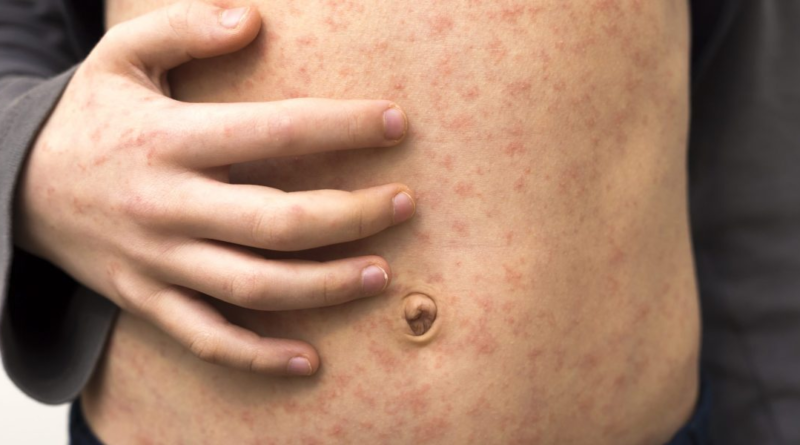Measles cases are mounting in the US as the UK declares a ‘national incident’ over the disease. What parents need to know to keep their kids safe
U.S. healthcare providers should be on alert for patients with symptoms of measles amid a global rise in cases of the disease, the U.S. Centers for Disease Control and Prevention said Thursday.
The CDC has been notified of 23 confirmed cases of measles since Dec. 1, including seven cases from international travelers and two outbreaks involving more than five cases each, the agency said in a Clinician Outbreak and Community Activity email sent to health care providers.
The Philadelphia Department of Public Health is tracking an ongoing measles outbreak, with nine confirmed cases, the agency said in a Jan. 22 press release. Two recent outbreaks occurred, one at a hospital and one at a day care center, both in December, according to a Jan. 26 update from the American Academy of Pediatrics (AAP). More than half of the cases were among children.
An additional outbreak has been reported in southwest Washington state, according to the AAP, with three lab-confirmed cases—all among unvaccinated adults. Additional cases have recently been reported in New Jersey and Georgia, according to the Center for Infectious Disease Research & Policy at the University of Minnesota. Virginia officials recently warned of measles exposures at two international airports.
Most of U.S. measles cases reported since Dec. 1 have occurred in children who hadn’t received their measles-mumps-rubella, or MMR, vaccine series, which consists of two shots, according to the CDC. Some of the sickened children were eligible for the shots but hadn’t received them.
“The increased number of measles importations seen in recent weeks is reflective of a rise in global measles cases and a growing global threat from the disease,” the agency said in the Jan. 25 email.
Reported U.S. measles cases reached 1,274 in 2019—the highest number seen since 1992, according to the CDC. This was before vaccination rates took a hit during the COVID pandemic due to lock-downs and pandemic-induced vaccine hesitancy, which affected even routine jabs with decades-long safety records.
While rates of measles cases reported in the U.S. fell drastically in the years that followed—reaching a subsequent high of 121 cases in 2022—public health officials worry that U.S. cases could again skyrocket.
UK declares ‘national incident’ after tens of thousands of measles infections
The World Health Organization’s European region saw more than 42,000 cases of the scourge least year, due in large part to a dip in vaccination rates. It saw only 942 cases the year prior. This month the United Kingdom’s Health Security Agency declared a “national incident” over outbreaks of the disease, the organization’s way of signaling a growing public health risk.
“Children who get measles can be very poorly, and some will suffer life changing complications,” UK HSA Chief Executive Professor Dame Jenny Harries said in a Jan. 19 statement. “The best way for parents to protect their children from measles is the MMR vaccine. Two doses of the MMR vaccine give lifelong protection, and it’s never too late to catch up.”
The disease was contributing to an increase in hospitalizations, along with mycoplasma pneumonia, WHO European regional officials said at a Jan. 16 press conference in Copenhagen, Denmark.
Globally, measles cases increased by 19% in 2022 over the year prior, and deaths by 43%, according to the WHO. That year, 9 million people were diagnosed with the disease, and 136,000 died, mostly children.
“The increase in measles outbreaks and deaths is staggering, but unfortunately, not unexpected given the declining vaccination rates we’ve seen in the past few years,” John Vertefeuille, director of CDC’s Global Immunization Division, said in a Nov. 16 joint statement with the WHO. “Measles cases anywhere pose a risk to all countries and communities where people are under-vaccinated. Urgent, targeted efforts are critical to prevent measles disease and deaths.”
Worldwide, more than 61 million doses of measles-containing vaccine doses were postponed or missed during the first three years of the COVID pandemic, increasing the risk of outbreaks in the U.S. and abroad, according to CDC data.
Measles vaccine has long record of safety, experts say
Many have never experienced the disease—one of the most contagious pathogens known to humanity—thanks to vaccines, which debuted in 1963. But Dr. Georges Benjamin, executive director of the American Public Health Association, tells Fortune that the illness is no minor matter, with the potential to lead to pneumonia, brain inflammation, hearing loss, intellectual disability, and death.
“This is a bad disease,” he says. “You don’t want to get measles.”
Measles is “not just a nuisance disease where people get rashes,” Dr. Lisa Saiman, a pediatric infectious disease specialist at Columbia University in New York City, tells Fortune. “A high proportion of babies do get hospitalized and need to stay in the ICU. That can all totally be avoided with vaccination.”
The measles vaccine, which has been around for decades, is incredibly safe, Benjamin and Saiman say. While allergic reactions rarely occur, as with any vaccine or medication, “we can treat allergic responses,” Benjamin says. “If you get measles, you might be very sick.”
It’s crucial that pregnant women ensure they received the measles vaccine at some point, Saiman says. That’s because pregnant women who contract the disease have a much higher risk of fetal demise, premature birth, or giving birth to a baby born with pneumonia or a brain infection.
Vaccination, she says, is “the single best thing that parents can do for their children.”
“Get them protected,” she says, adding that parents may not realize just how seriously public health authorities take vaccine safety.
“We have so many systems in place to monitor vaccine safety,” she adds, including ongoing studies of vaccines after they’re released.
Here’s what parents need to know about the potentially debilitating and deadly condition, one of the most contagious diseases the world has ever seen.
What is measles?
Measles is a highly contagious airborne disease that can lead to severe complications, disability, and death. It spreads when an infected person breathes, coughs, or sneezes, first infecting a person’s respiratory tract, then spreading throughout the body. And while it can affect anyone, it mostly infects children.
What are the symptoms of measles?
At the beginning of a measles infection, symptoms can mimic a typical cold, Dr. Lori Handy, a pediatric infectious disease specialist at the Children’s Hospital of Philadelphia and associate director of its vaccine education center, tells Fortune.
The fever, however, is typically “very high,” and “children look and feel highly miserable.”
“They’re not toddlers running around who have a 101° fever,” she says.
Initial symptoms, according to the CDC, include:
- High fever
- Cough
- Runny nose
- Red, watery eyes (conjunctivitis)
After 2 or 3 days, many patients develop tiny white spots, called Koplik spots, inside the mouth.
After 3 or 5 days, a rash begins with flat red spots that appear on the face at the hairline. The spots spread downward to the neck, trunk, arms, legs, and feet. The spots may have small raised bumps on top of them, and the spots may become joined as they spread. When the rash occurs, a fever may spike to over 104°.
Symptoms typically begin 8 to 12 days after exposure.
Is measles a serious disease?
It can be. More serious cases of measles can lead to complications like ear infections and diarrhea. The most serious cases can lead to:
- Hospitalization, in 20% of unvaccinated people who contract the disease.
- Pneumonia, in about 5% of children who get measles.
- Encephalitis, or brain swelling, in about 1 out of every 1,000 people who get measles. (This can lead to convulsions and subsequent deafness or intellectual disability.)
- Death, in 1-3 out of every 1,000 people who get measles.
- Pregnancy complications like premature birth or low birthweight, in pregnant women who haven’t been vaccinated.
It can also lead to “immune amnesia” after infection, increasing the risk of other severe infections for months or years, according to the AAP.
Any disease with a vaccine is, by nature, “highly dangerous,” Handy says. Such diseases “caused death or severe morbidity,” to the point that vaccine development was necessary, and should be avoided.
Who is most at risk for serious complications from measles?
According to the CDC, the following people are at greatest risk of complications from measles:
- Children younger than 5
- Adults older than 20
- Pregnant women
- People with compromised immune systems, such as those with leukemia or HIV
Is there a specific treatment for measles?
No. An antiviral doesn’t exist, experts say, though medical providers may choose to administer oral Vitamin A to patients, in a bid to improve outcomes.
Does measles cause long-term complications for those who survive?
It can, for some. Subacute sclerosing panencephalitis (SSPE) is a rare but fatal condition of the central nervous system that occurs around 7 to 10 years after a person contracts measles, even though they’ve fully recovered.
SSPE is always fatal. People who develop it generally die within 1 to 3 years of diagnosis, though some may survive longer. The risk for the condition may be higher in those who get measles before 2 years of age, according to the CDC. It occurs more often in females, and usually in children or teens.
Symptoms usually occur in stages and get progressively worse. They include:
- Personality changes, mood swings, depression, fever, and headache in stage 1, which lasts for up to 6 months.
- Uncontrollable jerking and muscle spasms, loss of vision, dementia, and seizures in stage 2.
- Writhing (twisting) movements, rigidity, and potential death in stage 3.
- Brain damage, coma, and death in stage 4.
Handy has seen several cases of SSPE during her years of practice and calls it “terrifying.”
“It’s progressive, with no cure,” she says. “It’s very sad, highly devastating, and there’s very little we can do to help. We have a vaccine that makes this so highly preventable. We just need to take the vaccine and all of this would go away.”
Is there a vaccine for measles?
Yes, and public health experts and medical professionals are pleading with parents to protect their children with it. The CDC recommends two doses of the MMR vaccine: one dose between 12 and 15 months of age, and another sometime between 4 and 6 years of age. The second dose, however, can be received earlier, as long as it occurs at least 28 days after the first dose.
What if I’m unsure if I was vaccinated for measles when I was a child?
Have a talk with your primary care provider or your child’s pediatrician, experts recommend. If your vaccine records can’t be located, a blood test can tell if you attained immunity to measles, either via infection or the vaccine. You’re free to skip that step, however, and get vaccinated—a potential repeat set of vaccinations is completely safe.
Good news for those who were born before 1957: It’s assumed that you had measles, and you should be protected, experts say.
Does the measles vaccine cause autism?
No, experts say. In 1998, a “fraudulent” research paper that asserted a link between the measles MMR vaccine and autism, without “robust scientific evidence,” was published in The Lancet, according to the WHO. Vaccination rates subsequently dropped below the level necessary to protect communities from the disease, causing cases to resurge in England, Wales, and parts of the U.S. and Canada.
In 2010, the paper was formally retracted by The Lancet. The British General Medical Council ruled that the study’s lead author had engaged in misconduct, and the author was banned from practicing medicine.




